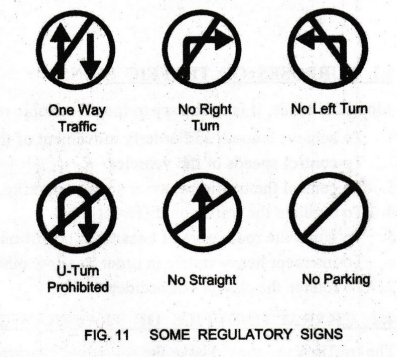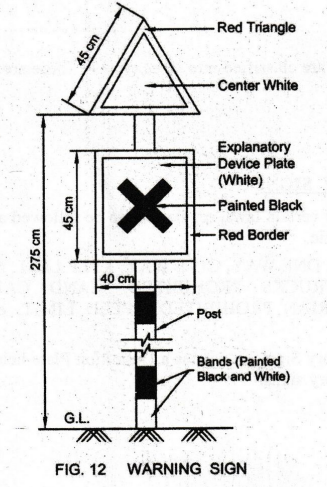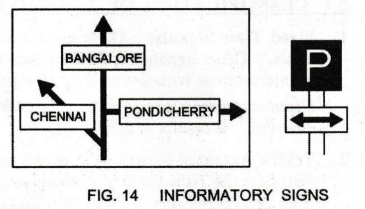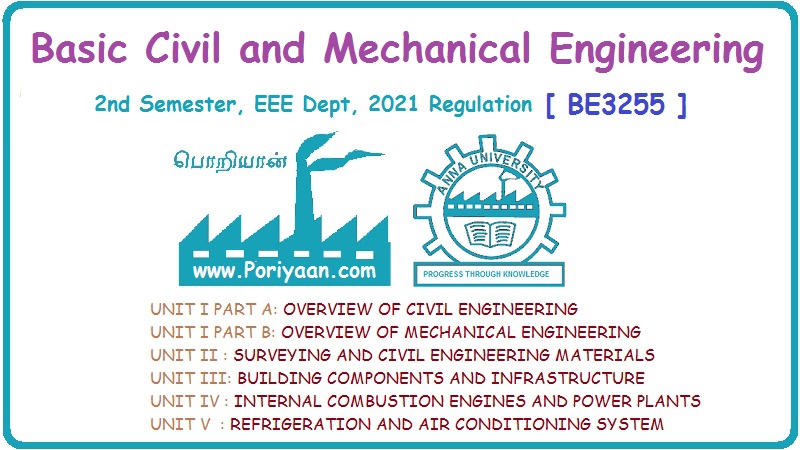Basic Civil & Mechanical Engineering: UNIT I: g. Transportation engineering
Traffic signs
Purposes, Characteristics, Types
Traffic Sign or Road Sign is a device mounted on a fixed or portable support. It conveys specific information by means of words or symbols
TRAFFIC SIGNS
Traffic
Sign or Road Sign
Traffic
Sign or Road Sign is a device mounted on a fixed or portable support. It
conveys specific information by means of words or symbols. Traffic signs should
be located in such a way that they are clearly visible for the drivers of the
approaching vehicles. They are installed where special regulations apply or
unusual conditions or hazards exist. The traffic signs are backed by law in
order to make them effective.
1. PURPOSES OF TRAFFIC SIGNS
Along
the roads, it is necessary to install suitable road signs for the following
purposes:
1.
To achieve smooth and orderly movement of the traffic.
2.
To control speeds of the vehicles.
3.
To control the traffic behavior such as parking, over-taking, etc.
4.
To regulate the traffic on different roots.
5.
To guide the road users of hazardous conditions ahead.
6.
To intercept heavy traffic in order to allow other vehicles and pedestrians.
7.
To reduce the chances of accidents.
2. CHARACTERISTICS OF TRAFFIC SIGNS
The
traffic signs should have the following characteristics:
1.
The traffic signs should be of large size on high speed roads.
2.
Spacing between the letters should be large and optically equal.
3.
Maximum number of words should be three..
4.
Size, shape, spacing and color of the traffic signs should be uniform.
5.
Traffic signs should be illuminated by light during night.
3. TYPES OF TRAFFIC SIGNS
As
per the Indian Motor Vehicles Act, the road signs are classified into three
types. These are:
1.
Regulatory Signs or Mandatory Signs
2.
Informatory Signs or Guide Signs 3.. Warning Signs or Cautionary Signs
4. REGULATORY SIGNS or MANDATORY SIGNS
Regulatory
Signs are used to inform the road-users of certain laws, regulations to be
followed and prohibitions so as to have a safe and free flow of traffic.
Regulatory
Signs include: STOP, NO ENTRY, ONE WAY, GIVE WAY, KEEP LEFT, NO PARKING, NO
HORNS, LORRIES AND TRUCKS PROHIBITED, HAND CART PROHIBITED, U-TURN PROHIBITED,
PEDESTRIAN PROHIBITED, SPEED LIMIT, etc. Violation of these signs is a legal
offence.
Fig. 10 shows the general design of a Regulatory Sign. It carries a Definition Plate below the circular disc.

Fig. 11 shows some of the regulatory signs.

5. WARNING SIGNS or CAUTIONARY SIGNS
These
signs are used to warn or caution the road users of hazardous conditions ahead.
Fig. 12 shows the general design of the Warning Sign. It is an equilateral
triangle supported on a post.

The
various warning signs are: Right-hand Curve, Left-hand Curve, Narrow Bridge,
Jigjag Curve, School Zone, Major Road Ahead, Narrow Road Ahead, Men at Work,
Guarded Railway Crossing, Unguarded Railway Crossing, etc. Fig. 13 shows some
of the warning signs.

6. INFORMATORY SIGNS or GUIDE SIGNS
See
Fig. 14. Informatory Signs guide the road user and give such information as may
be of interest during travel.

These
signs give useful information to the motorists to help them along their way in
simple and direct manner. An informatory sign is made of a rectangular board of
specific size.
Informatory
signs are: Petrol Pump, Hospitals, Route designations, Destinations,
Directions, Distances, Services, Points of Interest and other Geographical
information.
Basic Civil & Mechanical Engineering: UNIT I: g. Transportation engineering : Tag: : Purposes, Characteristics, Types - Traffic signs
Related Topics
Related Subjects
Basic Civil and Mechanical Engineering
BE3255 2nd Semester 2021 Regulation | 2nd Semester EEE Dept 2021 Regulation
